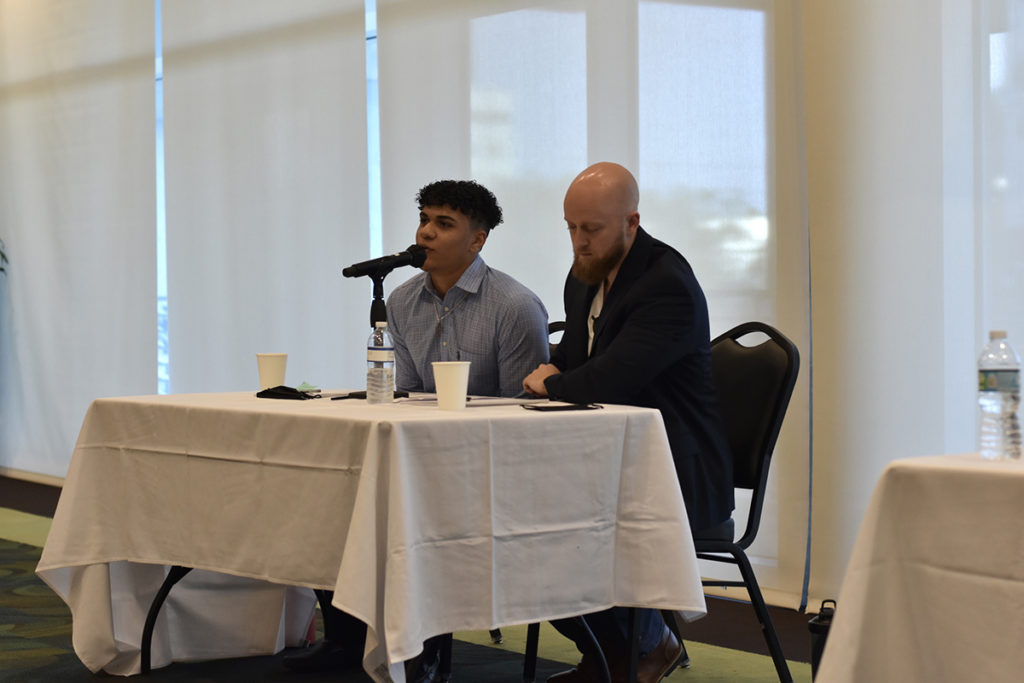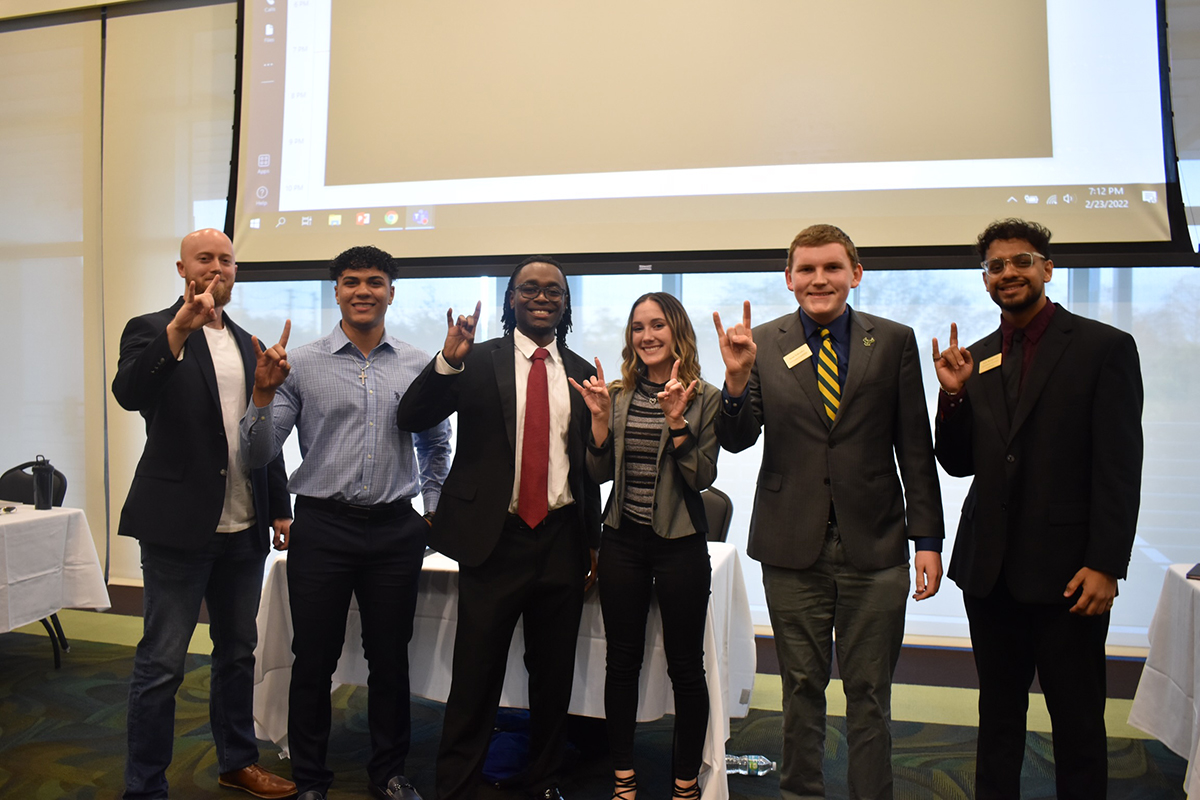Pictured above: (Left to right) Zackery Morales, Kenneth Bright, Nathan Poinsette, Kaiya Huggins, Sean Schrader and Joshua Rampertab are this year’s candidates for St. Petersburg’s governor and lieutenant governor seats.
Courtesy of Aubrey Carr | The Crow’s Nest
By Molly Ryan
Last week, candidates running for the governor and lieutenant governor seats at the University of South Florida’s St. Petersburg campus showcased their campaign during the Feb. 23 hybrid debate.
Held in the University Student Center ballroom, the hour-long debate was streamed via Microsoft Teams and moderated by The Crow’s Nest’s Editor-in-Chief, Sofía García Vargas.
Following last year’s uncontested gubernatorial race at USF St. Petersburg, three tickets are running to fill the seats in this year’s Student Government (SG) general election — the highest number of tickets since the university’s consolidation officially began in 2020.
Because of consolidation, the governor and lieutenant governor positions were formed in place of each campus’s president and vice president. Now, the president and vice president positions preside over the student body across all three USF campuses.
The three tickets are running to replace St. Petersburg’s current Governor Veronica Jimenez and Lieutenant Governor Eran Fruehauf.
The running tickets are:
- Kenneth Bright, a freshman health sciences major and communications minor, for governor and Zackery Morales, a health sciences major with a concentration in health care management, for lieutenant governor.
- Nathan Poinsette, a junior digital communications and multimedia journalism major, for governor and Kaiya Huggins, a freshman psychology major, for lieutenant governor.
- Sean Schrader, a senior business management major and current SG senator, for governor and Joshua Rampertab, a junior criminology major and current president of the Harborside Activities Board, for lieutenant governor.
Each ticket was given one minute to answer questions centered around topics such as candidate experience and background, sustainability, transportation and parking, housing and dining, accommodations and accessibility services, student wellness, maintaining a distinct campus culture and promoting open communication and transparency between SG and the student body.

Candidate experience
During the debate, each candidate shared experiences and traits that make them qualified for their prospective seat and how such things can benefit students once elected.
Bright expressed that as a freshman living in the dorms, he sees the concerns of both younger students and those living on campus firsthand.
As a military dependent student, Bright decided to work with Morales, a transfer student from St. Petersburg College (SPC) and veteran of the U.S. Coast Guard, to target the needs of groups like military dependents, veterans, transfer students and the older student population.
Similar to Bright and Morales, Poinsette is also military dependent and a transfer student from SPC, while Huggins is a freshman.
Poinsette emphasized his time involved with student organizations at SPC, including serving as the Student Government Association president at the Gibbs campus — where he helped make the campus a more “supportive” and “inclusive space” for the student body.
Huggins expressed that participating in her high school’s National Honor Society allowed her to gain leadership and service opportunities.
Alternatively, Schrader and Rampertab are both upperclassmen.
Schrader, an on-campus resident, attested that his current involvement with SG and Rampertab’s time as the current president of the Harborside Activities Board (HAB) would “provide a unique experience” and “new perspectives” for students under their administration.
Rampertab also shared that his experience as a peer coach to transfer students helped him build valuable relationships with that community.
Sustainability
The importance of working closely with organizations like the Student Green Energy Fund (SGEF) — the organization responsible for the campus’ comprehensive recycling campaign — to ensure the campus is maintaining its environmentally conscious progress was a priority for all tickets.
With SG holding the responsibility to allocate funds to on-campus organizations, Poinsette underscored the importance of listening to the “specific initiatives” that SGEF puts forward and “aid them in any way possible.”
“I believe that with this power, we should implement real change in regards to sustainability,” Poinsette said.
Poinsette also expressed that, under his administration, he would further advocate for the use of solar power on campus.
Schrader added that “there are a lot of other groups out there that do important work every day to make sure sustainable actions are being taken,” such as the Gardening Club and the Food Recovery Club.
According to Schrader, SG’s director of sustainable initiatives “has a focus on partnering with organizations,” wherein the governor should “empower” them to make sure “they’re able to continue that kind of collaboration.”
Morales raised the concern behind “recycling awareness” around campus.
“[Some students] see recycling bins and they don’t really know the difference, so they just throw [recyclable material] in the trash can anyways,” Morales said. “So, increasing that awareness on the direct impact [recycling] has on not just the environment, but our environment here at USF [will help] in taking care of our campus.”

Transportation and parking
With in-person class offerings steadily increasing after much of the university had gone online in 2020, the campus has seen more students commuting from around the Tampa Bay area and across different campuses — a rare occurrence prior to consolidation.
According to Schrader, many of the concerns raised by commuter students have centered around high costs for permits and fines.
While immediately lowering the prices is unlikely, if elected, Schrader plans to create a task force that would investigate student dissatisfaction behind parking on campus.
“We have to be realistic. We can’t just ask Parking Services to lower the costs and call it a day,” Schrader said. “But, I do think through diverse student perspectives and solutions, the task force [would bring] those findings to [Parking Services] — that’ll make it more representative for them. I think it would compel them to make some kind of change.”
Bright agreed with Schrader’s sentiment and conveyed that if elected, he would start with a proposal for free 48-hour guest parking on weekends.
“At the end of the day, we have to remember that Parking Services is a business,” Bright said. “But by engaging with students and asking them what we can do, not price wise, but service wise, is going to be the best way to go about it.”
Housing and dining
Throughout the debate, dining and housing was addressed with urgency by each ticket.
Rampertab and Huggins both raised the concern about the lack of dining options for both on-campus residents and commuter students.
Huggins also drew attention to bringing cheaper meal plans like the BULL Block 32 — a $600 plan only available to off-campus students and upperclassmen residents at the Tampa campus — to the St. Petersburg campus, alternative dining options, such as food trucks, and extending dining hours at The Nest.
“We need to extend dining hours for breakfast,” Huggins said. “The students that have class at 9:30[a.m.] get out at 10:45[a.m.], they miss [breakfast] by a 15-minute window.”
While Rampertab and Schrader conveyed that feedback would be needed to correctly gauge the demand for lowering housing and dining prices, in the meantime, the ticket offered to create a list of resources for students — such as the Bulls in the Burg and Feed-a-Bull programs.
However, Schrader attested that the rigidity of the situation would not keep his administration from advocating for affordability on and off campus.
“Although [affordability] is very important on campus, we have to look at those students who live off campus,” Schrader said. “We have to promote affordable housing, and that’s something that will require everybody’s work.”
Bright offered a solution to this by looking into scholarships that would financially aid students for dining expenses.
Similarly, Poinsette suggested to also offer housing-based scholarships and a meal voucher for students at the start of each semester.
Accommodations and accessibility
All tickets expressed their plans to keep options like hybrid class formats to accommodate immunocompromised students hesitant to return to in-person classes due to the COVID-19 pandemic, while also expanding accessibility on other fronts.
Both Schrader and Morales stressed the importance of every building on-campus being accessible through wheelchair ramps and elevators, according to the standards set by the Americans with Disabilities Act.
Rampertab underscored the importance of knowing what kind of services are offered through Student Accessibility Services.
Student wellness
In a similar vein, the tickets also addressed the surplus of students seeking counseling services and success coaching.
While Poinsette suggested a volunteer program for students interested in the counseling field and adjacent practices, Bright and Rampertab both agreed on spreading awareness of and expanding upon the services the Wellness Center currently offers — like drop-in group sessions and workshops.
“There’s so many different avenues that students can take advantage of, but don’t know,” Bright said. “Then they become overwhelmed, they become stressed — so many things pile on each other, then [students] have to go to the Wellness Center.”
Bright plans to promote “student wellness in general” and other campus resources like tutoring.
Campus culture
With consolidation, the governor and lieutenant governor are tasked with fostering campus culture within the boundaries of “OneUSF.”
“We support ‘OneUSF’ in the long term while still recognizing the differences between the St. Petersburg and Tampa campuses,” Morales said. “There are still glaring differences that the St. Pete campus students want recognized — for instance dorms, dining, parking, transportation and campus size.”
All tickets expressed that a form of ongoing communication between their administration, officials across campuses and the student body would be necessary to uphold St. Petersburg’s interests and maintain what makes the campus unique.

Transparency and communication
Following several controversies in 2020 and 2021 involving students in SG, this year’s general election highlights the importance of transparency and communication between the student body and elected officials across all three campuses.
More transparency and communication were viewed a necessity at both the gubernatorial and recent presidential debates.
During the debate, all tickets for St. Petersburg’s gubernatorial election expressed their willingness to speak and listen to students.
Poinsette and Huggins urged for students to know that if elected, they can come to their administration for “anything.”
Through establishing office hours and an open-floor segment at campus council meetings, Poinsette hopes to create “open minded communication.”
Bright hopes to address not only the “disconnection between the student body and the student government,” but the “disconnection we have internally as a student body” as well.
Echoing the sentiment of his running mate, Morales wants to be “as straightforward with students as possible.”
“We are also students, we are working for you,” Morales said. “We want to make sure that you’re being cared for as much as possible. We don’t want to tiptoe around the issues.”
Rampertab also conveyed that with Schrader, there would be a dedication to “work for students” through “keeping the door open all the time.”
“If we are fortunate enough to serve, we are not your boss — you are our boss,” Schrader said.
Voting for USF’s SG general elections is available here from Feb. 28 through March 3.



